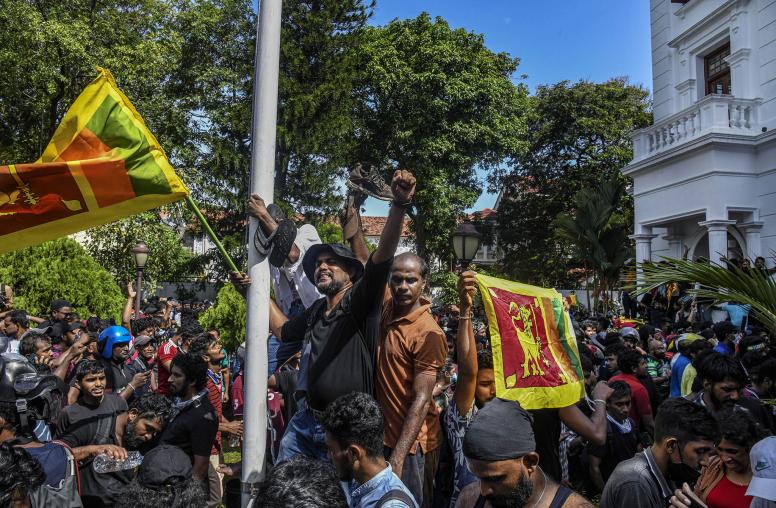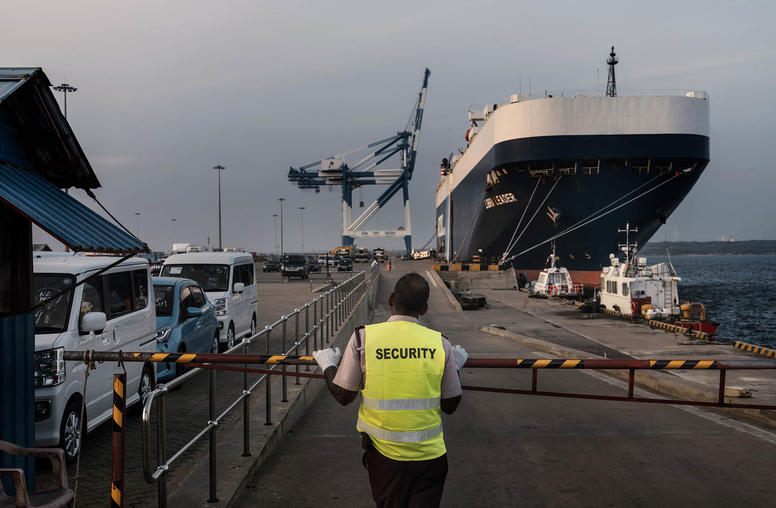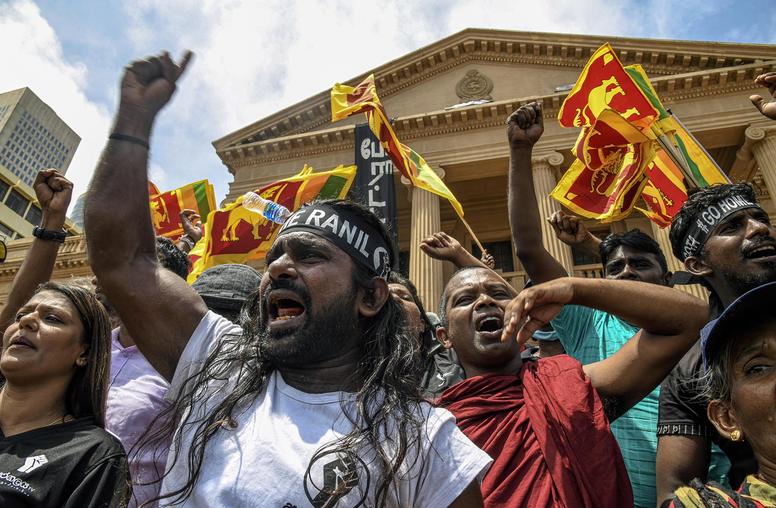Sri Lanka Teeters on the Brink
Constitutional reforms, IMF bailout seen as critical to helping the country out of twin political and economic crises.
Sri Lanka is grappling with its most serious political and economic crises since its independence in 1948. Navigating these interlinked crises will require reforming the South Asian island nation’s constitution to reduce the power of the executive presidency and securing a bailout from the International Monetary Fund (IMF), according to experts.

The U.S. Institute of Peace hosted a discussion on July 25 in which participants discussed the challenges facing Sri Lanka and the ways in which the new government can navigate them.
How Sri Lanka Got Here
The Rajapaksa family has dominated Sri Lankan politics for years. Mahinda Rajapaksa and his younger brother, Gotabaya Rajapaksa, are hailed as heroes by the majority Sinhalese community for defeating Tamil separatist rebels — the Liberation Tigers of Tamil Eelam — and ending more than two decades of civil war in 2009. But both Rajapaksas have also been dogged by allegations of war crimes. Mahinda Rajapaksa and Gotabaya Rajapaksa, who served as president and defense secretary, respectively, during the war, oversaw a brutal campaign that resulted in the deaths of as many as 40,000 Tamils, according to United Nations estimates. A 2021 U.N. report found that the Rajapaksa government had actively blocked investigations of war crimes, put senior military officials who were implicated in U.N. reports in alleged war crimes and crimes against humanity in positions of power and used anti-terrorism laws to intimidate civil society.
Further tainted by allegations of corruption, Mahinda Rajapaksa, who served as president from 2005 to 2015, lost his bid to become prime minister in 2015. However, when Gotabaya Rajapaksa was elected president in a landslide in 2019, he appointed his brother as prime minister.
As protests over shortages of food, fuel and medicines, power cuts and skyrocketing inflation gripped the nation earlier this year, Mahinda Rajapaksa resigned on May 9. Gotabaya Rajapaksa was chased out of office by the protesters and eventually submitted his resignation from exile in Singapore on July 14.
Bhavani Fonseka, a senior researcher at the Centre for Policy Alternatives in Colombo, described the fall of the Rajapaksas as a “spectacular collapse.” But even as the Rajapaksa brothers stepped down, their ruling party, the Sri Lanka Podujana Peramuna (SLPP), which has the largest number of seats in Parliament, picked Ranil Wickremesinghe to serve as the interim president.
‘No Escaping the Rajapaksas’
The choice of Wickremesignhe, a six-time prime minister, has done little to ease the popular unrest. In fact, Wickremesinghe appears to be using the same playbook as the Rajapaksas. He ordered the military “to do whatever is necessary to restore order” after protesters stormed his official residence in Colombo. His opponents, meanwhile, question his mandate to serve out the rest of the current term before elections in 2024.
Ambika Satkunanathan, a former commissioner of the Human Rights Commission of Sri Lanka, said Wickremesinghe doesn’t appear to want to face elections anytime soon. The crackdown on the protesters, she said, was an attempt by him to gain credibility with the military. “As successive executive presidents have done, the default refuge of the authoritarian is, of course, the state of emergency which they use to abuse human rights and crackdown on dissent,” she said.
Noting Wickremesinghe’s dependence on the SLPP for his political life, Fonseka said: “There is no escaping the Rajapaksas in Sri Lanka politics as it stands now.”
Satkunanathan said people were shocked by Wickremesinghe’s appointment because they did not realize the extent of political machinations in the country. “The Rajapaksas wield a lot of power as we saw in even how the president was chosen. The dysfunctional structures remain,” she said. Noting that some Sri Lankans believe that Wickremesinghe should be given a chance and that he can fix the country’s ailing economy, Satkunanathan said that this mentality is a problem because “for a majority of the people, as long as the economics is taken care of, who cares about the rest?”
Economic Mismanagement
The Rajapaksas are widely held responsible for the economic mismanagement of Sri Lanka. Akhil Bery, director of South Asia Initiatives at the Asia Society Policy Institute, said the economic collapse has been “long in the making.” Sri Lanka, he explained, runs a twin deficit — a current account deficit and a fiscal deficit, where it imports more than it exports and spends more than it brings in in taxation revenue.
Berry listed bad policy decisions, including massive loans taken out by successive governments to fund unviable vanity projects, tax cuts that the IMF estimates cost Sri Lanka 2.5 percent of lost revenue to GDP and an ill-advised fertilizer ban that resulted in food shortages. In 2020, Sri Lanka failed to qualify for the IMF’s “Rapid Financing Instrument” being offered to support the economies of countries hit by the COVID-19 pandemic because its debt was seen to be unsustainable. In March this year, Sri Lanka’s currency plunged to historic lows. “You have had this perfect storm of situations happening,” said Berry.
The Rajapaksa administration’s gross fiscal mismanagement was compounded by a series of internal and external shocks, including the 2018 constitutional crisis that prompted the European Union (EU) to issue travel warnings to its citizens, the 2019 Easter Sunday bombings, the COVID-19 pandemic and the global fallout from Russia’s invasion of Ukraine.
Berry said the new government’s use of the military to crack down on protesters could result in Sri Lanka losing its Generalised Scheme of Preferences Plus (GSP+) status with the EU. This would cost Sri Lanka’s textile industry trade benefits and be the “death knell” for the country’s economy, he said.
Prospects of an IMF Bailout
The focus now is on how Sri Lanka’s bailout negotiations with the IMF fare. Sri Lanka wants to borrow at minimum $3 billion. Tamanna Salikuddin, the director of South Asia programs at USIP who moderated the discussion, asked Berry whether the IMF would be able to engage with the new government if the unrest continues.
Noting that Kristalina Georgieva, the managing director of the IMF, has said that once the presidential election is resolved she expects bailout negotiations to move quickly, Berry said: “The question is, will there be any political will to implement the painful reforms that are needed.” He was skeptical that this will exists given the fact that “these are the same cast of characters in Parliament that were in the previous government.” One of the things the IMF will be looking for from the new government, Berry said, is a reversal of the 2019 tax cuts.
A Cautionary Tale?
Sri Lanka’s present predicament is seen by many as a cautionary tale for countries with high levels of debt. At the G-20 summit earlier in July, the IMF’s Georgieva said: “Countries with high debt levels and limited policy space will face additional strains. Look no further than Sri Lanka as a warning sign.”
Berry described Sri Lanka as “the standard textbook case of an emerging market crisis: import-dependent, a trade deficit, pegged exchange rate, high foreign currency borrowing, capital flight, balance of payments crisis and a sovereign default, and let’s not forget that there are still more loans in the pipeline that Sri Lanka is yet to default on.” He added: “It’s kind of a cascading effect of defaults unless the fiscal house gets in order.”
Prasad Kariyawasam, a former foreign secretary and ambassador of Sri Lanka to the United States, said the crisis in Sri Lanka is the consequence of a combination of populist politics and an entitlement culture that has turned democratic practice transactional. This has “contributed to macroeconomic imbalances over a long period of time where officials were unable to do much because the politicians were more [focused] on populist politics,” Kariyawasam explained. Further, a combination of a lack of good governance and accountability, deliberate weakening of institutions, misguided policies that affected sustainable growth, profligacy in government spending and deficiency in law and order contributed to the difficulties Sri Lanka is facing today, he added.
‘China Is Not Going to Help’
CIA Director Bill Burns on July 21 said “dumb bets” on high-debt Chinese investment were a factor in Sri Lanka’s current crisis. Salikuddin wondered if the crisis would be an inflection point for how Sri Lanka deals with China.
While China accounts for a significant amount of Sri Lanka’s loans, Berry said that as the head of MI6, the British intelligence service, recently noted, the Chinese have been more focused on capturing Sri Lankan political elites.
“China has not been willing to help out Sri Lanka in this crisis,” said Berry despite the fact that Sri Lanka pushed through the Hambantota Port project funded through Chinese loans. There is “a broad recognition that if you get caught in a debt crisis, China is not going to help.”
An Opportunity for Reforms?
While serving as president, both Rajapaksa brothers, using constitutional amendments in 2010 and 2020, consolidated the authoritarian governance model. At the time, “the narrative was we needed a strong ruler … and that all the power should be with the executive presidency,” said Fonseka. But Fonseka sees this as a significant governance problem, adding that there is now an opportunity for structural reforms, including abolishing the executive presidency altogether.
Salikuddin asked whether there is a legal and constitutional way to bring about such constitutional reform. The people have demanded a “system change,” which includes long-term reforms, said Fonseka, adding that there is clear support for abolishing the executive presidency. “Finally, people realize the crisis is directly linked to this office and the abuse of power of one individual,” she said.
Another area of reform, Fonseka said, is addressing the problem of rampant corruption. This is also a key concern for the IMF and Sri Lanka’s other partners.
Meanwhile, the prospects of reconciliation in the country remain dim. While not the first to do so, the Rajapaksas exploited Sinhala Buddhist nationalism. Satkunanathan described Gotabaya Rajapaksa as a “true believer” in Sinhala Buddhist nationalism, which she said “made him dangerous.” Militarization was another pillar of Gotabaya Rajapaksa’s platform and the military became increasingly involved in civilian life and public institutions.
“We need to really think of major changes not incremental changes,” Fonseka said. However, she predicted that given the SLPP’s control of Parliament there is little likelihood of the passage of any meaningful reforms. As a result, she predicted the humanitarian and economic crises will sharpen and public anger will grow. “Volatility is very much going to be the case, and the fear is that there are going to be new triggers for violence,” she said.



